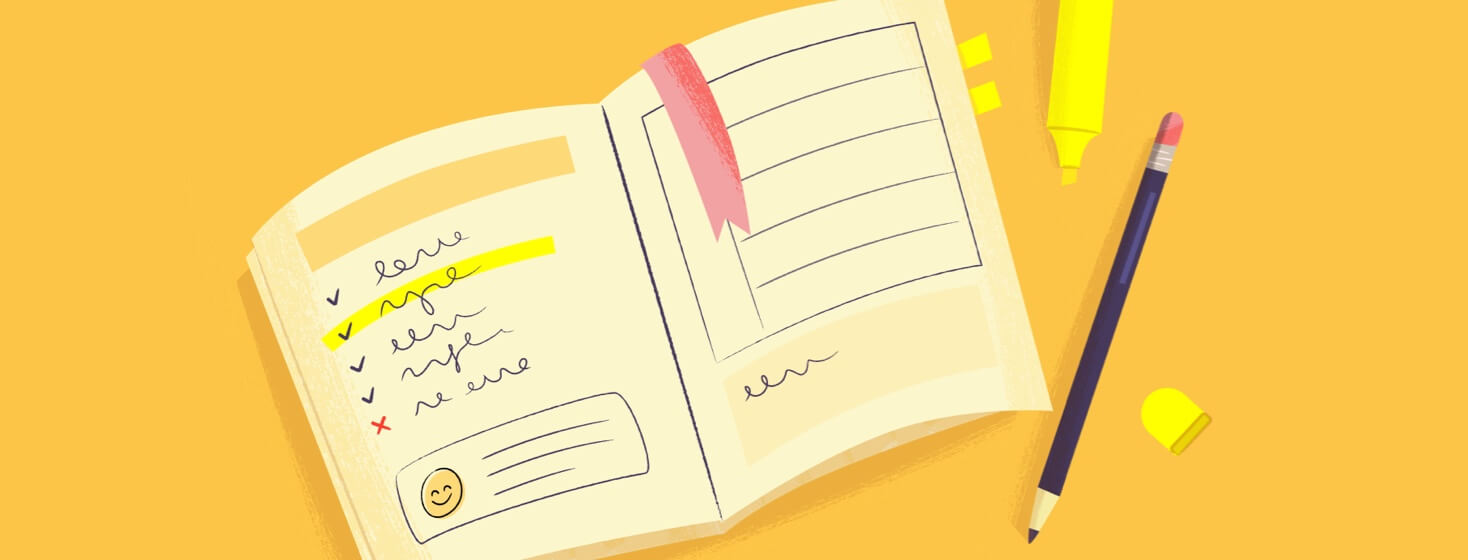How Bullet Journaling Helps With Brain Fog
When I was first diagnosed with blood cancer, I didn’t know about side effects like brain fog and memory loss. I also didn’t realize that it would become much harder to stay organized and remember even simple things. Sticky notes, computer spreadsheets, and reminder apps have helped, but I have searched for one main place to keep everything together. And I think I finally found it!
What is a bullet journal?
A bullet journal (also known as BuJo) was created by Ryder Caroll, who describes it as a way to help you “track your past, order your present, and plan your future.” A bullet journal is a combination of daily planner, diary and to-do lists. Since the pages often contain dotted grids instead of lines, users can record information in more organized and creative ways.
I started my bullet journal by copying ideas I liked online. I decorated pages with colorful markers and washi tape and used a ruler to make tables and calendars. Now, to save time and energy, I print the tables and calendars from my computer and tape them into my bullet journal.
What goes in my bullet journal?
- monthly calendar with appointments, etc.
- monthly bills in a table with date due, date paid, website, passwords, etc.
- monthly income in a table, including who paid and how much
- daily habit trackers (exercise, meditation, water intake) in a weekly chart
- daily medications and diet supplements in a weekly chart (see example below)
- daily/weekly to-do lists
- birthdays of friends and relatives
- auto-ship orders subscriptions along with their renewal dates
- location of important documents
- pet’s grooming needs (nails clipped, medications, etc.)
Sample medication table for a month that begins on a Tuesday:
| oral chemo | med #1 | med #2 | vitamin #1 | |
| 1 Tues | ||||
| 2 Weds | ||||
| 3 Thurs | ||||
| 4 Fri | ||||
| 5 Sat | ||||
| 6 Sun | ||||
| 7 Mon |
Sample table for monthly bills:
| date due | amount | date paid | website | password | |
| Electric bill | |||||
| Gas bill | |||||
| Medical Insurance |
My bullet journal keeps me organized
Even though I keep important information on my laptop and get email reminders of birthdays and auto-ship order dates, I have struggled to keep it all straight. I would forget to cancel a subscription until it was too late and forget to give my dog his flea and tick-prevention meds, even though it was on my calendar. Plus, I was occasionally missing doses of my oral chemotherapy.
Since creating my bullet journal, I haven’t missed a thing, and I even caught a medical billing error. I jokingly refer to my bullet journal as my alternate brain. It may not think for me, but it frees up the mental energy that I once used trying so hard to remember things. Since the journal lives in the middle of my dining room table, I remember to look at it several times a day.
Other benefits of a bullet journal
As an extra benefit, I can see patterns and connect what I did with how I felt. I can also see whether I am meeting my goals and adjust them as needed. Like me, my bullet journal is a work in progress. If I think of something new, I just make a page for it.
Also, my bullet journal is private, so it stays in my house. Should I become very ill or even pass away, someone would have access to necessary information. This is not something I enjoy thinking about, but I would rather do it while I still can and not leave a mountain of work for my family.
Other bullet journal ideas
There are so many helpful ways to use a bullet journal. Some like to create an index in the beginning and number the pages to make things easier to find.
There are also unlimited possibilities for what to include, but these will be unique to you. What will help help you to stay organized and help you meet your goals? Consider these:
- cleaning schedules
- meal planning
- food diary
- sleep tracker
- mood tracker
- doctor’s notes
- inspiring quotes
- random thoughts/artwork
What tools do you use to cope with brain fog or memory loss due to blood cancer? I would love to hear about it in the comments!

Join the conversation